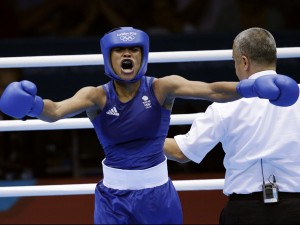Women’s boxing finally steps into Olympic ring

Great Britain’s Natasha Jonas reacts after her fight against the United States’ Quanitta Underwood during a women’s lightweight boxing match at the 2012 Summer Olympics, Sunday, Aug. 5, 2012, in London. AP/Patrick Semansky
LONDON – Nicola Adams and the first Olympic women’s boxers have little time to enjoy the history they made in their debut Sunday. They’ve all got to fight for medals on Monday.
World champions Katie Taylor, Ren Cancan and Savannah Marshall lead the 24 remaining women into the quarterfinals, with the winners all guaranteeing they’ll end the landmark tournament on the podium.
“There’s no time to enjoy anything,” said Natasha Jonas, the British lightweight. “Making history, breaking records, that’s all great, but I’m here to fight.”
Women’s boxing finally punched through the door to the only all-male sport in the summer program with its Olympic inclusion. The debut in the Olympic ring not only proved the sport’s legitimacy, but showed it might be a must-see event before too long.
The fighters all understood the history they made with every punch. They couldn’t let it distract them from their Olympic goals.
“We waited so long,” said Swedish middleweight Anna Laurell, who fought in the original women’s world championships 11 years ago. “I’m so proud to be here. I felt almost tears when I was walking to the ring and I could hear the crowd and my family. I lost a bit of concentration for my fight, but I got it back.”
Russia’s Elena Savelyeva won the first bout with a busy jab and strong combinations. U.S. lightweight Queen Underwood lost a close fight to Jonas. The crowd roared for almost every punch, clearly enjoying the tight competition and disciplined styles of the world’s top female boxers.
Indian flyweight Mary Kom also fought in the first world championships in Scranton, Pa., in 2001. She became a national icon with her international success in an unlikely sport, but often wondered whether she would ever wear an Olympic uniform.
That’s one reason Kom wept after winning her Olympic debut, 12 years after she defied her father’s wishes to pursue boxing — and on her twins’ fifth birthday, no less.
“Every athlete wants to play in the Olympic Games, and these past years, we’ve been waiting and waiting,” said Kom, who beat Poland’s Karolina Michalczuk. “When will boxing be in the Olympic Games? I waited 12 years because I wanted to play. I’m very emotional, but I’m fighting in the ring. I am winning.”
Perhaps it’s appropriate that this historic tournament ended up in Britain, which banned women’s boxing until 1996.
Barbara Buttrick, the English boxing pioneer known as the Mighty Atom during her dominant pro career in the 1950s, attended the fights and got a loud ovation before the show. Every fighter in London has a story of overcoming prejudices or misconceptions while turning this brutal pastime into an Olympic aspiration.
“It’s a long time coming, and it should have happened a long time ago,” said Gloria Peek, the U.S. assistant coach with 34 years in the sport. “It’s going to do a whole lot to revive boxing, because boxing is dying a little bit. Women have skills, and it’s nice they get to showcase them now.”
The boxers’ talent was clear, yet so was their perspective on the moment. The fighters usually hugged after putting on a succession of lively fights, showing a sportsmanship that the men’s amateur sport sometimes loses in its incessant squabbling about narrow decisions.
Savelyeva beat North Korea’s Hye Song Kim 12-9 in the opening bout, which also featured a female referee, Algeria’s Kheira Sidi Yakoub. Kim threw the first punch of the Olympics, but her looping right missed the ducking Savelyeva, who soon proved too elusive in a well-matched bout.
“It was a total pleasure to make history,” Savelyeva said. “I tried to show my pride in women’s boxing. It was an amazing thing to do.”
Gender equality still is a nebulous concept around the world, of course: The fans were greeted at the ExCel arena by eight female dancers in tight outfits who performed an NBA-halftime-style show before the biggest day in women’s boxing history.
Michalczuk and Australia’s Naomi-Lee Fischer-Rasmussen then wore skirts into the ring, choosing the gender-specific outfit allowed by amateur boxing’s governing body, but criticized by most fighters. Fischer-Rasmussen’s skirt was particularly short, although she wore compression shorts underneath.
Most fighters wore the same style tank tops and shorts worn by the men.
The final bout was won by Nigeria’s Edith Ogoke, an ebullient middleweight with heavy hands who idolizes Joe Frazier. She crumpled to her knees after getting a rare decision for Africa, whose boxers typically struggle internationally.
“Whenever I’m in the ring, I think of Smoking Joe,” said Ogoke, who believes women’s boxing will grow exponentially in Nigeria and beyond after this tournament. “I’m going to smoke my opponents the way he used to fight.
“I’m very happy, because I lived my dream. Today, I am an Olympian.”